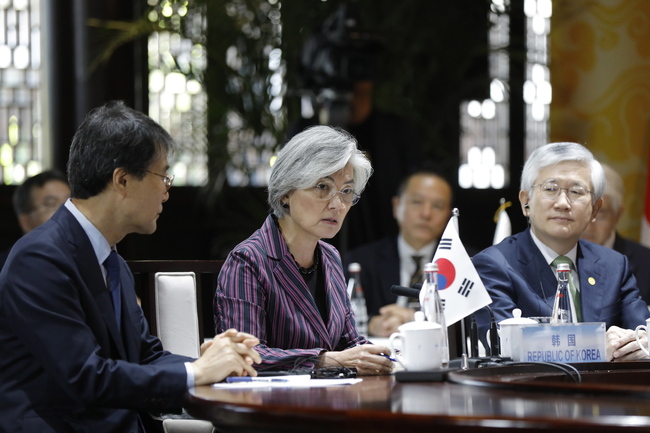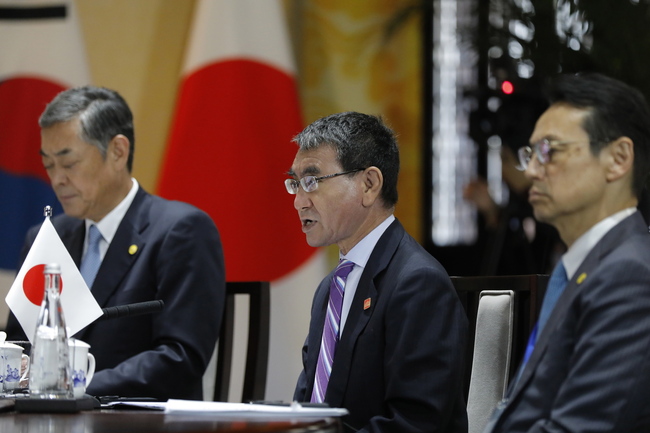 |
|
South Korean Foreign Minister Kang Kyung-wha makes her remarks during a meeting with the Japanese and Chinese foreign ministers in Beijing on Aug. 21. (EPA/Yonhap News)
|
How far is Seoul willing to go to respond to Tokyo’s trade measures?
Reports that the Blue House plans an announcement shortly on whether to extend its General Security of Military Information Agreement (GSOMIA) with Japan – a question it has weighed as a means of pressuring Tokyo in response to its economic retaliation measures – are turning attention to the level of Seoul’s response. The reports come in the wake of bilateral foreign minister talks in which both sides merely reaffirmed the differences in their positions. A Blue House official said on Aug. 21 that an “announcement on whether GSOMIA will be extended should be made as early as Aug. 22 and no later than Aug. 23.” While the Blue House’s plans have reportedly already been decided internally, the official explained that they would need to undergo a final review by the National Security Council (NSC) standing committee on Aug. 22, after which a report would be made to President Moon Jae-in and the administration’s approach would be announced. The likeliest approach currently being considered by the Blue House would involve extending GSOMIA in view of the importance of trilateral security cooperation with the US, while suspending information exchanges for the time being as a means of pressuring Japan. But heavy opposition to renewing the agreement from within the ruling Democratic Party could prove a variable in the late stages. Speaking at a discussion held the same day by the Korea Broadcasting Journalists Club, Kim Sang-jo, Blue House policy chief, explained, “South Korea-US-Japan security cooperation is a very important matter, and this is not a decision that can be made lightly.” “We plan to continue examining things until the very end in terms of the question of whether we should be exchanging sensitive military information with a country that claims not to be able to trust South Korea, and we will be making a careful decision,” Kim said. No common ground was reached at South Korea-Japan foreign minister talks the same day in Beijing, with both sides holding firm to their opposing positions. But they also sent the clear message that communication and discussions on the issue would continue to take place between the relevant officials. Despite being the second meeting to take place amid the South Korea-Japan conflict touched off by Tokyo’s announcement of export controls against South Korea on July 1, the foreign minister talks represented more or less their first occasion to date for full-scale diplomatic negotiations. The two sides continue to have difficulties finding common ground on the particulars, however. South Korean Foreign Minister Kang Kyung-wha was bluntly critical of the unilateral export control measures imposed by Japan. “Countries should demonstrate through their actions the consensus among the three sides’ foreign ministers that the free, fair, transparent, and predictable trade environment that has served to underpin peace and prosperity in Northeast Asia must be firmly established,” she said. “We must eschew unilateral, arbitrary trade retaliation measures and clear away the uncertainties that now hover over regional trade,” she added.
 |
|
Japanese Foreign Minister Taro Kono makes his remarks during a meeting with Kang and the Chinese foreign minister in Beijing on Aug. 21. (EPA/Yonhap News)
|







